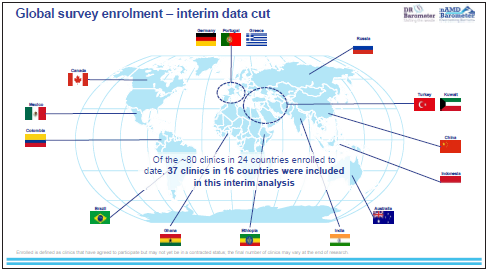Better Education Needed for DME and DR
Survey shows patients are not alone in requesting educational material. Cheryl Guttman Krader reports.

Cheryl Guttman Krader
Published: Wednesday, November 9, 2022
There is a clear need for improved educational materials and jargon-free explanations from practitioners to help patients with diabetic macular oedema (DME) and diabetic retinopathy (DR) better understand the disease and treatment options, according to the results of a global survey presented by Anat Loewenstein MD, PhD.
“Clearly, we need to do better, as 55% of patients said they did not know how many treatments they would have in the next 12 months, and 50% stated they did not know how long the treatment would last. Over 65% of patients said they found it extremely important to have better material available to understand their DME,” Professor Loewenstein said.
The survey’s goal is to better understand DME and DR management from the perspectives of patients, physicians, and clinic staff. It’s part of the larger, Bayer-sponsored, Barometer programme—an international coalition of experts in retinal disease coming together to enhance care and treatment outcomes by considering the needs and perspectives of patients, caregivers, and healthcare professionals.
“This survey is, to our knowledge, the largest initiative of its kind, providing detailed and systematic data on the challenges and opportunities for managing DME and DR,” she said.
A total of 80 clinics in 24 countries were enrolled at the time of the presentation, with 37 clinics in 16 countries included in the interim analysis Prof Loewenstein presented. The data included 1,073 patients with DME (932 adherent and 100 non-adherent to treatment), 640 patients with DR, 275 providers, and 558 clinic staff.
Key findings thus far show 41% of patients with DR said they had not received any information about what to expect with treatment over time, while 53% of providers said their clinics did not have sufficient educational material for patients about their condition or what to expect over time.
“There is a clear opportunity here to improve educational material about DME and DR since both patients and providers agree that it is extremely important to have better material available to them. This is an important and relatively easy point to improve,” Prof Loewenstein said.
The survey showed some clear differences between adherent and non-adherent patients: adherent patients were more comfortable asking their doctor about DME and diabetes and were also more likely to seek help in managing their disease.
Interestingly, only 26% of providers and 20% of clinic staff considered themselves trained to an expert level in how to avoid jargon when communicating with patients, and 29% of providers and 37% of clinic staff indicated they would like more training to address this deficit.
Responses to questions on anti-VEGF treatments and contraindications of anti-diabetic medications also highlighted the need for greater training.
“Only 40% of providers considered themselves trained to an expert level on the use of anti-VEGF treatment, and only 15% considered themselves trained to an expert level on the contraindications of anti-diabetic medications, which was a bit surprising to us,” Prof Loewenstein said.
Measures to help improve the overall situation could include tailored, easy-to-use educational materials or short information sessions with providers, staff, and patients to improve access to information, education, and guidance, she said.
The survey, Prof Loewenstein concluded, finished October 2022, and results of the full analysis as well as country analyses will be presented at future meetings.
“The final analysis of this global survey will hopefully generate a wealth of detailed and systematic information to facilitate the enhancement of care and improve treatment outcomes for our patients,” she said. Prof Loewenstein presented the interim results of the survey at the 22nd EURETINA Congress in Hamburg, Germany.
Anat Loewenstein MD, PhD is Chair of the Department of Ophthalmology, Tel Aviv Sourasky Medical Center (TASMC), and Professor of Ophthalmology and Vice Dean, Tel Aviv University, Israel. anatl@tlvmc.gov.il
Prof Loewenstein is a consultant to Allergan, Bayer, Beyeonics, Foresight Labs, Notal Vision, Novartis, and Roche.

Tags: diabetic macular oedema (DME), diabetic retinopathy
Latest Articles
Glaucoma Treatment Under Pressure
New techniques and technologies add to surgeons’ difficult decisions
Outside the Box, Inside the Pipeline
Researchers are tackling glaucoma diagnosis and treatment from all sides.
The EHDS Is Ready for the Green Light
If proposal is approved, Europe could see better access to, and exchange and use of, health data.
ESCRS to Release Guidelines for Cataract and Refractive Surgery
Comprehensive approach to the safest and most effective modern surgery.
Barry Fellowship Opens Up ‘Whole New Field of Thought’
The 2022 recipient combines theoretical and practical to learn new treatments.
Digitalising the OR—Experience and Perspectives
Benefits include saving time and improving outcomes.
Dynamic Measures Needed for Quality of Vision
Functional visual acuity testing and straylight metering may better reflect real-world conditions.
What Is Stopping Digital OR Adoption?
Ophthalmologists know the benefits—now it’s time to construct the right plan.
Time to Move Beyond Monofocal IOLs?
European surgeons appear hesitant to first offer other presbyopia-correcting options to patients.